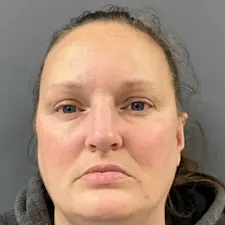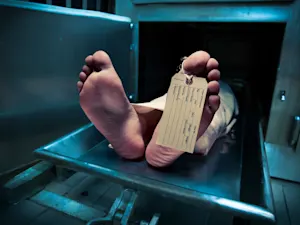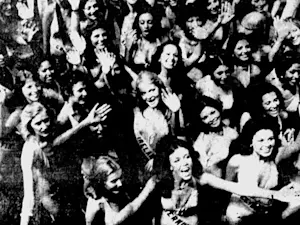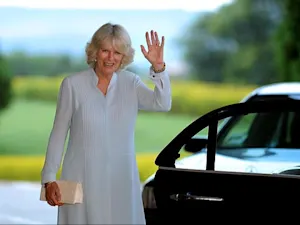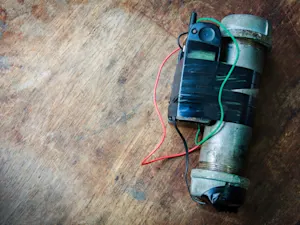
TV Bailiff Accused of Murder: Tragic Accident or Sinister Intent?
Renard Spivey's 2019 mugshot. Photo courtesy of the Houston Police Department.
The tragic case involving Renard Spivey, a former Harris County deputy and TV bailiff for the show "Justice for All with Judge Cristina Perez," has gripped the nation. In 2019, Spivey was accused of fatally shooting his wife, Patricia Spivey, during an alleged domestic altercation at their Houston home. The case presented a complex narrative that left many questioning whether it was a tragic accident or an intentional act of murder. In 2025, Spivey broke his silence in an emotional interview with "48 Hours," "Deputy Spivey On Trial," shedding light on the personal turmoil that continues to haunt him.
Events Leading Up to the Shooting
On July 27, 2019, Spivey and his wife, Patricia, were at home when an argument broke out over suspicions of infidelity. Patricia questioned Spivey about an alleged affair, which he denied. Later, as he attempted to kiss her goodnight, she rejected his affection and turned her phone away from his view. Spivey, curious about her behavior, waited until she was asleep and took her phone to examine it in another room. Moments later, Patricia confronted him, holding his gun and demanding her phone back.
Spivey claimed he panicked upon seeing her finger on the trigger and attempted to disarm her. During the struggle, the gun reportedly discharged, injuring Spivey in the leg and fatally wounding Patricia as it went off two more times in the scuffle. Patricia was pronounced dead at the scene with two gunshot wounds, to the chest and arm.
Life Under House Arrest
While awaiting trial, Spivey's attorneys requested bail, which was set at $50,000. He made bail under conditions set by the judge, including a prohibition on attending Patricia's funeral. Reflecting on this, Spivey expressed his frustration, saying, "That's my wife. I was in love with my wife. Why not be there? I just wanted to pay my respects. That's all," according to CBS News. During the four-and-a-half years leading up to his trial, Spivey spent most of his time with family, exercising at the gym, and attending church.
The Trial
The trial began in November 2023 and marked a turning point in the case. Led by renowned Houston attorney Dick DeGuerin and his legal team, Spivey's defense focused on proving that Patricia's death was a tragic accident rather than a deliberate act. Spivey took the stand to share his account, expressing deep regret and describing the incident as a devastating loss.
A key component of the defense was the 911 call Spivey made immediately after the shooting. In the call, his emotional tone and desperate attempt to perform chest compressions to revive his wife were highlighted to support the claim that the shooting was unintentional. The defense also presented forensic evidence suggesting a struggle over the firearm, asserting that Spivey attempted to grab the gun from his wife during the argument, which led to its accidental discharge.
Attorney Dick DeGuerin emphasized the gun's lack of an external safety mechanism, explaining, "There is no external safety on this gun. So, if someone's finger is on that trigger, all it takes is a slight pressure and it goes off," as reported by CBS News. By combining emotional testimony, expert analysis, and evidence of mechanical flaws in the firearm, the defense worked to create reasonable doubt about the prosecution's claim of intentional murder.
In contrast, the prosecution questioned why someone of Spivey's stature — standing 6 feet, 3 inches tall and weighing about 290 pounds — would have to wrestle over a gun with his wife, who was significantly smaller at 5 feet, 6 inches tall. They also found it hard to believe that a firearm could discharge multiple times by mistake.

The Jury's Verdict
During the trial, DeGuerin's brother, attorney and co-counsel Mike DeGuerin, said the jury asked a single question: What is the definition of reasonable doubt? The DeGuerin brothers said they believe the jury's doubt stemmed from the state's inability to prove who was holding the gun that was fired. Spivey's defense team also believes the jury doubted the state's theory that he killed his wife because his marriage was falling apart.
After a lengthy trial, a jury found Spivey not guilty of murder, as reported by ABC 13 News.
While the court's decision has cleared Spivey of legal guilt, questions remain about what truly transpired that day. The case leaves behind a legacy of unanswered questions, sparking debate over the fine line between accident and intent in matters of domestic conflict.
References: In first interview since being accused of murder in Texas, a TV bailiff sobs, "I live with it every day" | Former Harris Co. deputy on 911 audio central to his defense, leading to acquittal in wife's murder






